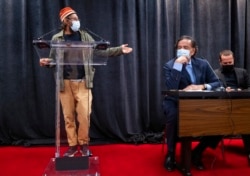An American journalist who had been held in Myanmar for 176 days returned to the United States on Tuesday.
Danny Fenster, 37, was freed on Monday, days after a Yangon court sentenced him to 11 years in prison on charges filed by the junta.
The release came after negotiations between the Myanmar military government and top U.S. officials, including former congressman and ambassador to the United Nations, Bill Richardson.
"I think journalists are the most vulnerable because when they report the facts, they upset these governments. And so for that reason they're vulnerable. And I think they should be given special attention for protection," Richardson told VOA Tuesday. "I mean, we should protect every political prisoner, hostage, especially American. But I see journalists across the board being more vulnerable everywhere, not just in Southeast Asia but in Russia and Latin America for their reporting, and that's wrong. They're doing their job."
"I just have so much gratitude right now," Fenster told reporters in New York after his flight home, adding that he only had hints about the negotiations to free him.
"I was able to get little hints of what was going on and occasionally got the experience of, outside of the prison, in court, maybe some police aide that could speak a little bit of English would flash a picture on his phone of my entire family wearing T shirts with my face on it on CNN. It was a pretty bizarre thing to see," he said.
Fenster is the second American journalist to be released from Myanmar since a military coup February 1 ousted the democratically elected government. Nathan Maung was detained for 98 days after police in March raided the offices of Kamayut Media where he was working.
Fenster was arrested at Yangon International Airport on May 24 as he boarded a flight to the U.S. to see his family in his hometown of Detroit.
At the time, he was working as the managing editor for Yangon-based news site Frontier Myanmar.
The American was held at Insein prison and charged with incitement, unlawful association and visa breaches. Charges of sedition and terrorism were later added.
Fenster's lawyer, Than Zaw Aung, told VOA the junta believed incorrectly that Fenster was still working for the news outlet Myanmar Now.
The outlet is one of several that the military banned after seizing power.
Fenster had sufficient evidence that he had left the company last year, months before the coup, and Myanmar Now confirmed that he no longer worked for the outlet.
But a court on November 12 sentenced Fenster to the lengthy sentence.
Ihar Tsikhanenka and Tommy Walker contributed to this report.






